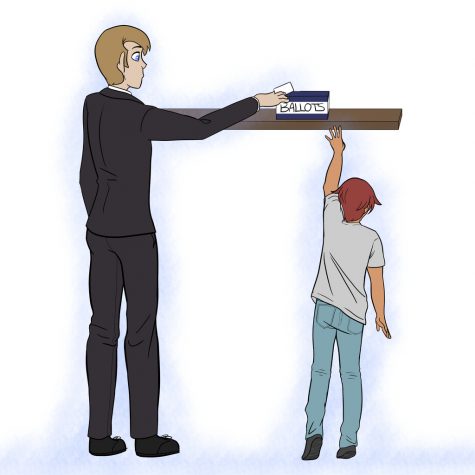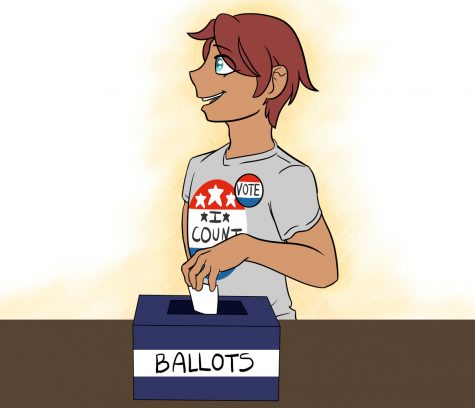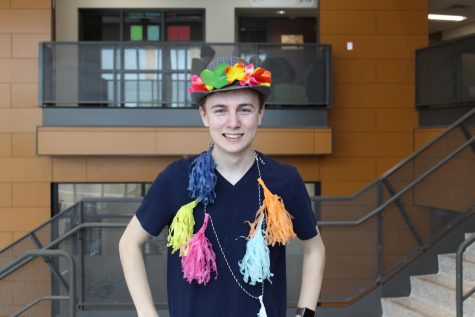The American voting age: should it be lowered?
March 9, 2019
art by Gillian Mousseau
The voting age should be lowered to sixteen
Throughout America’s history, policies on voting have changed continuously to reflect a constantly evolving culture. At the beginning of the United State’s elections, only white men aged 21 or older with a claim to a piece of land decided who held seats in office. However, amendments have been added to expand electoral responsibilities to people of all races and genders over the age of 18, making voting an intrinsic civil right for all American citizens. In a society that is increasingly impacted by the political activism of the youth, it’s time to extend that right to 16 and 17-year-olds nationwide.
According to neuropsychologists, humans have two types of cognition: hot and cold. Hot cognitive abilities are put to use in stressful situations with short reaction periods, while cold cognitive abilities are used under conditions like voting; less stressful experiences with a significant amount of time to consider options. In his 2009 study, developmental psychologist Laurence Steinberg found that by the age of 16, adolescents are fully prepared to make decisions using cold cognition, and therefore are perfectly able to cast a genuine vote. This data directly contrast the claims that teenagers would put elections in jeopardy due to their biological inability to make informed choices. Yet, while the voting age is fixed at 18, 16 and 17-year-olds use an enormous amount of hot cognitive abilities every day while driving and working legally, arguably bigger personal responsibilities than submitting a ballot.
It’s often reasoned that lowering the voting age is useless because 16 and 17-year-olds simply don’t want to vote, but election data from Takoma Park, Maryland, a city that allows 16 and 17-year-olds to vote in local elections proves otherwise. In 2017 the National Association of Student Personnel Administrators (NASPA) reported that Takoma citizens under 18 made up 16.9 percent of all voters in the 2017 election. The turnout rate for 16 and 17-year-olds accounted for nearly half of all residents that fit within that age group, four times higher the turnout rate for 18-year-olds. These results demonstrate significant youth interest in electoral participation within the U.S. Furthermore, statistics aside, voting isn’t a business. Supply and demand isn’t a vital fiscal issue where voting policies are concerned, and lowering the voting age would ultimately be of sole benefit of the youth and the candidates they decide to support. Just as all citizens above 18, the youth who want to vote will vote, and those who don’t will stay home.
Another popular argument against lowering the voting age claims that 16-year-olds are simply not educated enough to vote. This debate, however, ignores that fact that there are no required educational prerequisites for adults to cast their ballots. Presumably it is hoped that those voting would have passed their freshman government class, but there is no process for submitting high school transcripts to the state along with registration forms, and certainly, no pop quiz on the candidates before a ballot is accepted. Voting as an American citizen is a right in the U.S, regardless of whether an individual dropped out of high school or graduated with a Ph.D., and restricting voting privileges based on a supposed lack of education has historical roots in racist and sexist anti-suffrage movements.
Just the last year has shown the American public how much youth advocacy can make a difference, exemplified by the significant political presence of survivors of the Parkland shooting in Feb. 2018. Because of continuous legislative gun control efforts of friends and family of the victims, as well as pro-gun rights advocacy by 17-year-old Kyle Kashuv, debates concerning weapon laws have shifted to the forefront of American politics. Based on both the demonstrated interest and the important changes these high schoolers have accomplished, it’s clear that lowering the voting age would make a significant difference.
It’s time to let go of unfair stereotypes and uninformed misconceptions about teenagers and recognize that lowering the voting age is neither a dangerous or useless prospect. Data from Takoma, Maryland has demonstrated that youth in the U.S are interested in exercising their right to vote, and the recent political climate in America has seen a significant influence from 16 and 17-year-olds even in the absence of an amended election policy. Basing the minimum age to vote on suspected immaturity, apathy, and lack of education is a ridiculous and unfounded standard that the U.S would do well to abandon. The plain truth is that youth will continue to be politically active no matter what the voting age is. Allowing 16 and 17-year-olds to cast their ballots would direct that advocacy towards candidates that reflect the values of the next generation.


With a resume chock full of empty space, Page Editor Greyson Mize is a force to be reckoned with in all career realms. Although he has many talents, Mize...
The voting age should be kept at eighteen
With the rapid spread of information possible due to the internet, people all around the world are given easier access to news than ever before. The intense widespread scrutinization possible due to the availability of online media has led to a rise in political involvement by all age groups, including young children and teenagers. At incredibly young ages, kids can advocate politically and share their opinions in an attempt to make their voices heard. The culture of outspoken and politically active teens has led some to believe that teens should be allowed to formally vote on these topics at the age of 16 rather than 18. However, lowering the voting age creates its own issues and could lead to an unstable, unprepared, and uninvolved voting populous in America.
While some kids under 18 in the United States are politically active, they are usually financially dependent on older guardians and do not pay for their own wants and necessities. Gallup, a company that conducts nationwide surveys every year to a variety of demographics, found that 71% of teens interviewed said their political views were pretty much the same as their parent’s views. Additionally, with younger and less mature children, these votes can be easily influenced by other opinions in the family household rather than the teen’s true opinions and feelings. This doesn’t allow teens to express their opinion by having the ability to vote but rather acts as a way for others to express their opinions more than once.
Some argue that teens actively participate in society by getting driver’s licenses and entering the workforce with part-time jobs. Because they are beginning to do adult activities like working and driving, there is an argument that they should also begin to do other important tasks usually reserved for mature adults, including voting. However, rates for both teen participation in the workforce and teen driver’s licenses have plummeted in recent years, with the percentage of 16 and 17-year-olds with licenses dropping from 47% to 24% since 1983 and the percentage of teens between ages 16-19 currently employed dropping from 57% to 33% since 1989. This data, provided by the U.S Bureau of Labor Statistics and a study by the University of Michigan Transportation Research Institute, implies that while some teens are certainly involved in adult affairs, the majority of 16 and 17 year olds simply are not active participants in enough debated political issues, such as topics relating to economics and transportation, to be allowed to make decisions for people that are involved.
A potential cause of this decline is the rising societal emphasis on high school and preparation for post-secondary education. Students spend more time on their schoolwork and, as a result, have less free time to spend on getting driver’s licenses or getting part-time jobs. This is supported by the fact that the decline of teen licenses and teens in the workforce is inversely proportional to the number of students in America attending some form of post-secondary education after high school, according to the US Department of Education. Students spend more time preparing for college than they do working or getting driver’s licenses, further distancing them from topics that are commonly voted on.
Historically, the changing of the voting age has only occurred when an age group felt underrepresented politically despite major social contributions. Last time the voting age was changed in the United States, it was because 18-year-olds were allowed to enlist in the military and fight for their country, but they weren’t allowed to make any political decisions after returning home. This led to a massive campaign to lower the voting age to accommodate the soldiers returning from Vietnam, which was made into law in 1971 and officially lowered the voting age from 21 to 18.
This raises questions about lowering the age once again; what has changed for 16-year-olds since the 1970s? How would a 16-year-old accurately make decisions on a national scale on topics they are legally not allowed to participate in, such as joining the military? Lowering the voting age, while beneficial to particularly active teens, opens up questions about whether someone should be allowed to vote about topics they aren’t legally allowed to participate in. Teens can be politically active in other ways and there is no need to lower the age in order to have their voices heard.


